If you are not Disabled and you are demanding the use of Person First Language (PFL), you are being ableist.
If you are Disabled and you are demanding that other Disabled people use Person First Language, you are being ableist.
If you are Disabled and want to use Person First Language when referring to yourself, I will respect that. I will also respect your right to demand that other people use Person First Language when referring to you.
But the Person First Language concept is ableist, and I can tell you why.
I do know the history of PFL. I also know that it was co-opted by non-disabled people who believe they are the authorities in what we should say and how we should identify ourselves. And that is the definition of ableism.
Proponents of PFL have some “explanations” for why everyone should use this language, and such explanations fail in every way.
The first one is:
“See the person, not the disability”.
I want to quote Lawrence Carter-Long because, as proud disabled, we don’t feel ashamed of our disabilities. He said:
“If you “see the person not the disability” you’re only getting half the picture. Broaden your perspective. You might be surprised by everything you’ve missed. DISABLED. #SayTheWord”
Note: Lawrence Carter-Long wasn’t talking specifically about PFL. The hashtag #SaytheWord is, according to him “bigger”. I still like the quote and all that it means. You can read about it here.
So, deconstructing the “explanations”.
“See the person, not the disability”.
I want to debunk the notion that by using PFL society treats us better. If anything, it helps with the stigmatization of Disabled people. Instead of “seeing” us, society ignores us, we become “voiceless” and “invisible”. There: debunked. But there is more.
Do you, PFL proponent, really see me (only me) and not my disability?
If your answer is yes, you are being ableist because you ignore an important part of me. If you ignore my disability, how are you being an ally – as you claim – and how are you going to support me (and all Disabled people) when we demand to be heard?
If you insist that you will support us, and continue to use PFL, you are being ableist because I (and many others) already said that respecting us means listening to our preferences, instead of demanding that everyone uses a language that we reject. You make it all about you, your preferences, your choices. How is this respecting me (and all Disabled people)?
Then there is the other explanation:
“You are much more than your disability”.
I cannot argue with the statement itself but I will deconstruct the reasons why you use it.
I am Disabled.
I am Autistic.
I am female.
I am awesome (according to my friends).
So you, PFL proponent, is probably “correcting” me and saying: you are “a person with a disability”; “you have autism”.
If you stand by this language, why don’t you say that I am a person with femaleness? After all, I am more than just female. Why don’t you say that I am a person with awesomeness? I am more than just awesome, too.
I will spare you the time to try – and fail – to explain your PFL usage. You will try to say that a disability does not define me. How do you know it doesn’t? I define myself and my disability does define me. You are being ableist by telling me how I should feel about being Disabled.
Or maybe you don’t think awesome people are people? Absurd, isn’t it?
The reason is clear: you see disability as something that makes us less valuable, something broken, something not quite right.
You use Identity First Language for the things you consider positive. Disability, to you, is negative. This is ableism.
If you still try to explain yourself, you are doubling down on the ableism because you are not listening, and you are silencing us.
Now, if you start using PFL when referring to everyone, then I will join you: for example: “you are a person with femaleness that has a lot of awesomeness, a lot of smartness. Are you a person with religiousness?”
Sounds ridiculous, doesn’t it? Made my point. PFL is ableist AND ridiculous.
There is another “explaining” I hear a lot:
“PFL is the acceptable/official/used everywhere language”.
Acceptable to whom? This is the greatest example of PFL as ableist language. It is silencing. It says non-disabled people are the ones who know what is “better” for Disabled people. It says that we, Disabled people, are non-persons who cannot define ourselves. It makes the choices of non-disabled people for disabled people, “official”. PFL is not acceptable to me, and it is not acceptable to a lot of Disabled people. If you claim to be an ally, if you claim to use PFL because you respect us as people, you are NOT respecting us.
If you insist in using PFL because you don’t want to create “controversy” and defy the ableist society, if you use PFL because it is more comfortable to you, you shouldn’t claim to be an ally or advocate.
If you continue to use PFL after we asked you, after we told you we want Identity First Language, you are ableist, you are silencing us, and you are not an ally.
If you continue to use PFL claiming that this is the only way you will get heard and advocate for us, feel free to stop your advocacy in my name. You are being an ableist and I don’t want an ableist ally.
#SayTheWord. The word is DISABLED
For more on PFL: http://fmmiyakawa.com/2016/02/18/rhetorical-fault-lines-part-1/?fb_action_ids=10153835365826136&fb_action_types=news.publishes

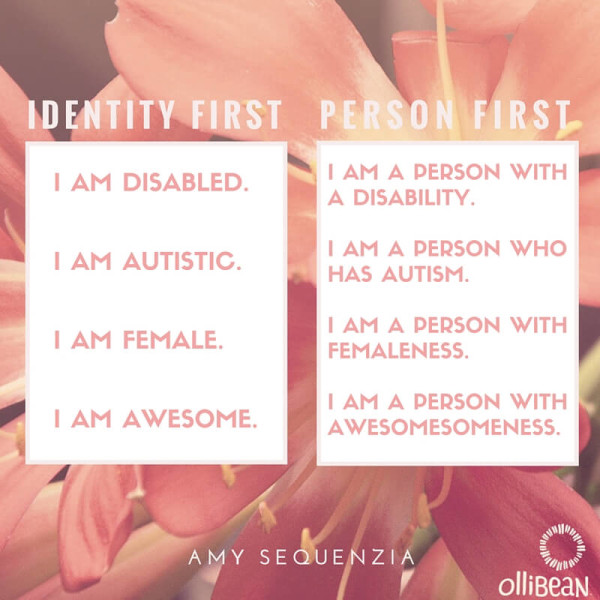
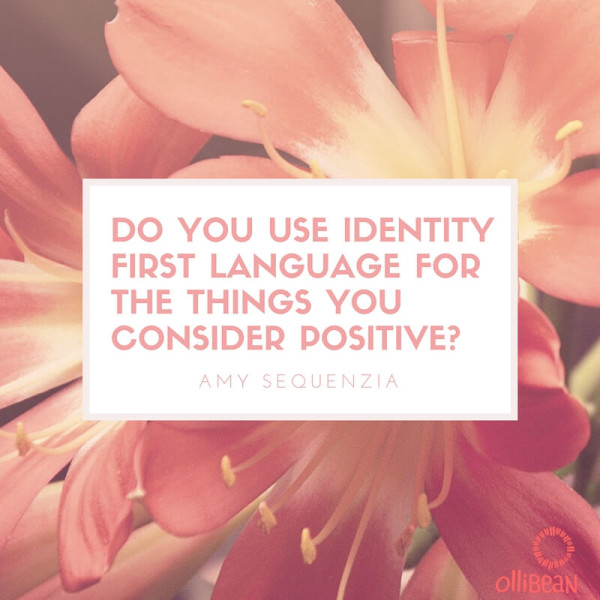
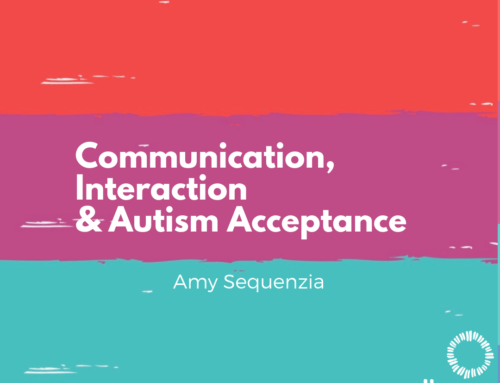
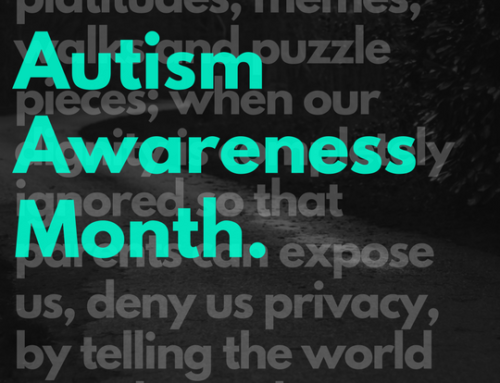
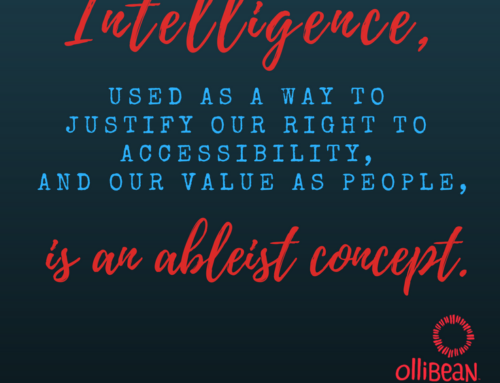
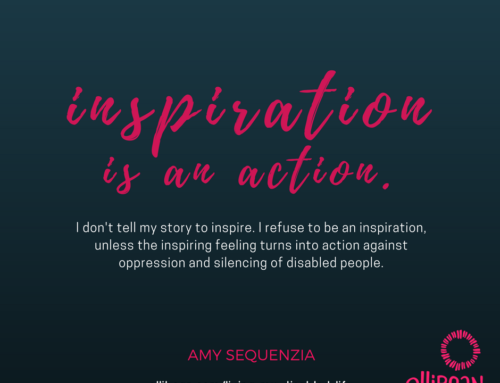
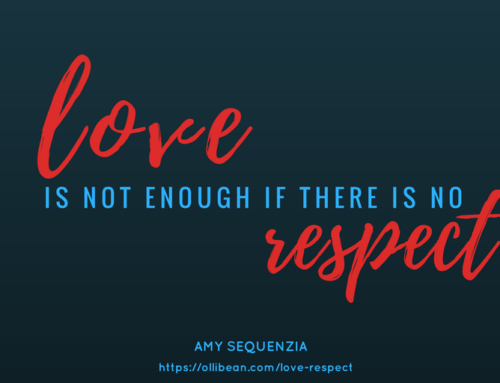
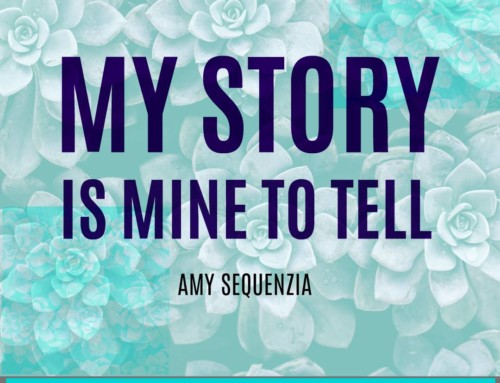
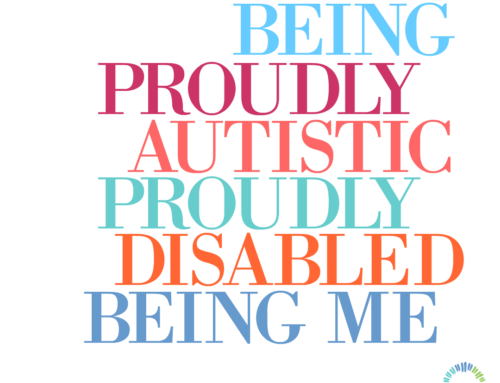
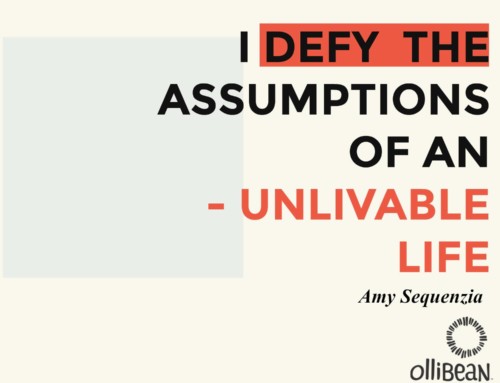
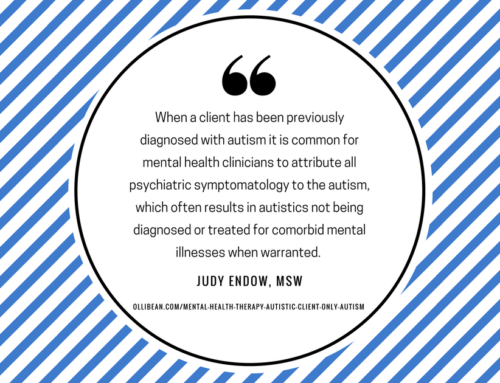
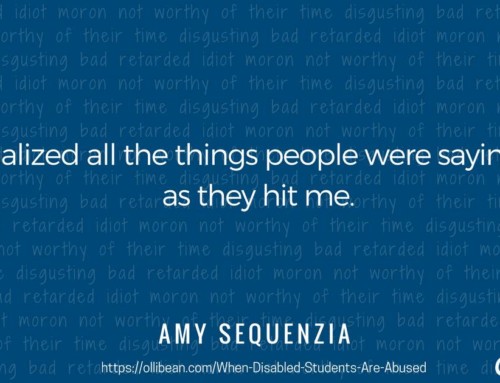

Amy, you continue to be an absolute QUEEN when it comes to saying what a lot of autistic people want to say and can’t find the right words for it. Thank you for this, I’ve already shown it to someone who didn’t “get” it and now they do.
Hey! Thanks for this piece. Almost a decade ago when my daughter was born with Down syndrome, PFL was a hot topic. I never got particularly inflamed when people didn’t use PFL, but I know it did and, honestly still does, chafe me when people say she “IS Downs” or “A Downs.”
I have bipolar disorder. I both say, “I have bipolar disorder,” and, “I’m bipolar,” interchangeably. I don’t consider either an insult. Just facts. But there is something about Down syndrome that seems like a gray area in this “PFL or Not” arena. Maybe because it’s a syndrome? For instance, I wouldn’t call someone a Carpal Tunnel, or say, “She is carpal tunnel.” Same with Chronic Fatigue, or well, take your pick of syndromes.
Perhaps the discrepency is with the name of Down syndrome. While there are common medical conditions brought on in a person w Ds, it is primarily a physiological and cognitive difference. My daughter also has autism and I use “has autism” and “is autistic” interchangeably.
Perhaps it’s got something to do with nouns vs. adjectives. (Although I’m getting over the flu and I’m having a little trouble figuring out just what I am getting at with that one.)
Anyhow, I’m just musing. I’m grappling with why I feel differently about these different terms. I have a disability, my mother is disabled, my daughter is as well. As a product of this society–someone who was raised in the 70s-90s–I’m still working against my own abelism, I admit that. All that programming! I totally get what you’re saying, but I can’t put my finger on why it bothers me when people say she IS Downs. She is, and I’m fine with that. But she’s a girl with a name.
Come to think of it, I used to work with a little boy who had spina bifida, and it never would have occurred to me to call him A spina bifida, or say he IS SB. Would someone with SB say, “I’m spina bifida,” in the way they’d say, “I’m autistic, or bipolar?” I don’t know the answer to that.
It’s interesting and my goal is not to offend. So help me here. I hear you on the disabled, etc…but when it comes to specific disabilities, it seems like there is likely a world of opinions.
Thanks for the discussion topic!
You are right, it does not work for all disabilities. Down Syndrome is part of a community that, as far as I know, prefers to be referred to using PFL.
My main point is to point out how people (usually non disabled) demand that disabled people use PFL. It is a personal choice, in some cases it can be applied to a community (like people who have Down Syndrome)
The other point is not about each specific case, but about the concept that, depending on the disability (autism, for example) PFL complies with the ableist view of an ableist society (the majority non-disabled saying how we should call ourselves)
Potentially interesting point, in France if I recall correctly, they use the identity-first form “trisomique”
I would never say that a person “is Down’s”, but I might say that they’re “a Down Syndrome person”. How would you feel about that?
More generally, there’s actually three levels of identity->person first language. There’s using an identity noun (an autistic, a lesbian, an aroace, a student, etc), there’s using an adjective before the noun (an autistic person, a gay man, a black person, etc) and then there’s person first language (a person with autism, a person with Down Syndrome, a person with blue eyes, etc). And I know some people who prefer identity first adjectives for a trait, but would get upset if you nouned that same trait. (Although personally I’m OK with being called an autistic or an autistic person, I’m more comfortable with the latter.)
Honestly, I think that telling other disabled people how to describe themselves is unfair. If a person with a disability chooses to describe themselves with that exact wording, then that is their prerogative. I am many things and my being blind is only one of them. I am by no means ashamed of my disability. I am however extremely proud of the fact that I am a lawyer or an ice skater. I describe myself as a “lawyer who is also blind” because I’ve earned my right to be a lawyer and I just happened to be born blind. I also adjust the placement of the words to the particular situation in which I am at any given time. I however don’t mind how other disabled people refer to themselves. It is absolutely and unequivocally their choice. Period.
Telling potential allies and advocates that you don’t want their help simply because they choose a particular way of referring to the disabled community when that community has no general agreed upon consensus is illogical and counterproductive. We are already less vocal than other groups and find fewer allies and advocates. That translates into slowed progress. It also scares away potential allies and advocates who may not want to offend. There is already a great deal of awkwardness involved in everyday interactions between the disabled and non-disabled. Why on earth would anyone want to exasperate and heighten that feeling? If a disabled person has asked a specific individual with whom they interact regularly to refer to them in a particular way and that non-disabled person refers to do so for a non-legal or medical reason, then that is a totally different matter altogether. Beyond being an ableist, that non-disabled person is being a jerk.
I spend my days helping disabled, chronically ill, and elderly clients access Medicaid covered managed long term care that allows them to remain in their own homes and communities for as long as possible. The project couldn’t find attorneys who were comfortable with discussing a clients disability because they were afraid that they would accidentally say the wrong thing or couldn’t relate to the client because of a lack of common experiences. The crazy part is that how disabled person defines themselves doesn’t even have any real world ramifications in what I do. It all comes down to money. How little can an HMO plan spend before we file a grievance or appeal.
Just my perspective Again, when it comes to how we refer to ourselves, to each their own. If we as a community ever fully agree (or manage a near majority), on how to refer to ourselves, then we should absolutely present that consensus to the rest of the world in a non-confrontational way that makes our case for why a particular way of referring to us or asking us to refer to ourselves has real world implications that harms our goal of equal acceptance, opportunity, and respect. I definitely understand the frustration of being told how to define myself by others who have never been in my shoes. I certainly have preferences for words that describe me and some days secretly hope that they’ll catch on.
I agree with you that disabled people are the ones who choose how to describe themselves. I say that in the third paragraph of the article.
I stated that I don’t want the help of people who claim to advocate for me, still continuing to demand the use of PFL. I really don’t. I have told people to stop speaking on my behalf, unless they use my choice of language. If other disabled people don’t mind this, this is also their choice and I will not argue that.
I know a lot of people who are Autistic who want to be called Autistic. It costs me nothing to respect their choices – and I appreciate that not a one of them has ever referred to me as “mentally ill.”
Jeanmarie Bishop, I agree with you and respect your choice to be referred to by the language you prefer
I agree with this comment, Amanda, and have tried to convey the same sentiment in other discussions. I just don’t understand the vitriol and insistence on “us” vs. “them”. It is polarizing, and as you said, “counterproductive” to the cause. I am not advocating for someone’s insistence on using PFL when the person they’re referring to indicates an IFL preference. But I do think they may need to understand why they should use IFL. What I’m saying is that most of the discourse on the topic seems to come from a super defensive place and really doesn’t need to. This is not a sarcastic question, but I wonder if addressing the topic from a place of “I’m trying to educate you”, as opposed to “How dare you idiots disrespect us?!”, there may be more progress in the movement.
I have a graduate degree in ASD, and will assert that for most of my undergraduate and graduate work in special education, we were taught PFL. It was a big ‘ol sin not to. Then, all of a sudden, the neurodiversity movement gained momentum and more people became aware of the autistic community’s IFL preference– but those of us working and learning in special education programs weren’t exactly privy to the change or the reasoning, and are now finding ourselves under scrutiny and attacked for using PFL-without even giving the switch a chance to be known. THAT is what is creating distance. This artcle, and others like it, vilify people for something they’re unaware of. They need to know the reasoning behind the switch, and I think Amy has done a good job of giving those reasons- but I do still sense a tone of condescension and animosity in the message.
As a parent of an autistic son, I never liked the usage of PFL because it sounded like he had an illness or disease, so I interchangeably use PFL and IFL when referring to my son and students, based on the grammatical structure of my sentence. I also recognize many characteristics of autism in myself, especially in childhood and adolescence, yet I wouldn’t exactly refer to myself as “autistic”. But if I did choose to self-identify, I wouldn’t consider myself disabled, as I am not.
Kelley, when it comes to Autistics educating non-autistics, it seems that is never enough. I have been “polite”, I have asked, I have explained. I still have people demanding that I use PFL
In any case, this post is about how the CONCEPT of PFL is ableist. If that does not explain why we prefer it, I don’t know what will.
And don’t forget that the cause you mentioned is our cause. Non-disabled/neurotypical people can be allies but we lead the cause.
Telling potential allies and advocates that you don’t want their help simply because they choose a particular way of referring to the disabled community when that community has no general agreed upon consensus is illogical and counterproductive.
Except that Amy didn’t say that, she said that ‘well-meaning’ help from so-called ‘advocates’ who refuse to listen to us in how to speak about us is worse than no help at all. After all, if someone doesn’t listen to me when I say I prefer to be called an autistic person rather than a person with (a disease called) autism, then how can I know they’ll listen to me when it comes to my needs and how best to meet them?
I am a parent of a child with ASD (my son is autistic). I have a physical disability (I’m diasbled). I suppose I have always used these ablist phrases out of respect (presumed respect). For the first time, someone has brought me to the other side – I hear you and agree with you. Thank you. But when I hear people in the disabled or autism community talking about what the autism or disability community feels – as a group – I feel separated at times because they’re talking FOR me or my son. There is still the feeling of exclusion WITHIN the disabled and autism communities… where there should be at least the feeling of belonging and acceptance there. We live in an ablest world – no doubt. That needs to change. I feel it every day. But we all need to do a better job at respecting individuality, not formulating opinions and expectations for a whole group. There is quite a difference (spectrum) in the autism world. With regard to disabilities, everyone handles the diagnosis, disability, disorder, condition differently. That it is OK. But I feel that it is a personal attack when people say that the autism community or disability community feels a person’s conviction is wrong, that an intervention is wrong, that an organization is wrong, how I want to be called is wrong. It is not wrong for everyone. So perhaps we all need to advocate for less blanket statements both in the disabled community AND in the neurotypical community. Your post really hit home, but I don’t think it speaks to everyone. Plus this horribly ableist world is still a humanity that is focused on strength, ability, voice, winning, competition, etc. I think we need to get to acceptance. But we have to change people’s perceptions before we get there. Societal change. Human conditioning. I live it personally. Living in the abled world as a disabled person. It wIll not change beating heads or making blanket statements for all. For meI think it’s helping me understand that it’s about doing things WITH each other, not for us. Recognizing each other’s strengths and similarities, before the challenges and differences. Getting rid of stigma and tolerance, and spending more time and effort empathizing and understanding. Asking if help is needed rather than assuming incompetence. We need to make this a natural part of our humanness. We are ALL affected by disability in some way – by genetics, age, illness, accident, etc. We are humanly “flawed” and what we need to fix is people’s perception of human perfection. There are no special needs – we all have needs, they are all important. We all have ways we want the regard ourselves, that is important.
I definitely don’t speak for everyone. I make it clear in the article that disabled people themselves should decide the language they use, and how they want other people to refer to them.
As for community, regarding autism, there is the autism community and the AUTISTIC community. The AUTISTIC community are Autistic people. We, the ones who use IFL – the majority of adults I know, and some I know of – prefer IFL and we are often corrected. This is ableist because it assumes we cannot know enough about ourselves to make a choice.
I stand by my statement that anyone who DEMANDS PFL (non-disabled people demanding disabled people use PFL) is being ableist.
Anyone who, after we state our choice of language and still uses it when referring to us is also ableist. I had this conversation with my father. It took a while for him to get it but now he only refers to me, or when talking about me (as in what I write) to other people, using IFL. He also gets the looks and the complaints, but he stands his ground.
I just don’t know how I feel about this. I want to respect how everyone wants to refer to themselves, but I would definitely prefer to be referred to as a ‘person WITH bi-polar disorder” than “a bi-polar person” , who is so many other things than just being bi-polar. I thought that was the whole point of this phrasing, anyway.
I definitely don’t appreciate being called “a mentally ill woman.” I don’t really appreciate being referred to as “a woman with mental illness,” either, but I prefer it to the former. This is identity politics, and it sucks.
Christa, you are right and everyone should respect your preference when referring to you. People should refer to you using PFL.
I’ve just been reading (with some incredulity, I might add, as the parent of a delightful autistic young woman) reviews of a book called A-U-T-I-S-T-I-C How silly is that? by Lynda Farrington Wilson. The gist of the book (which I haven’t read, I’ve only read the reviews) seems to be that “having” autism can be compared to “having” blue eyes or swimming ability. It is written specifically to instruct children not to call someone autistic. It appears (if the reviews are accurate) to overlook completely the way that the autistic brain shapes the person and is an integral part of who they are – completely unlike, say, eye colour or swimming ability. And yet I didn’t come across a single negative review of the book. What it doesn’t seem to do (and again, I stress I haven’t read it, I only came across reviews of it today) is affirm that people have a right to be called whatever they choose. Then I happened upon your article, and it was like a breath of fresh air. It makes me wonder how a book like that gets published without, presumably, being run past any autistic people. Have you read it or come across it? I would be interested to hear from an autistic person whether I’m overreacting or being oversensitive on my daughter’s behalf – and yet I can’t really imagine a book like this being published in the UK without there being an outcry from the autistic community (and, hopefully, some of their parents, too).
Some disabilities just don’t lend themselves to IFL because they are nouns without an adjective form. For example, I am a person with Postural Orthostatic Tachycardia Syndrome, Migraines, and Joint Hypermobility issues. I am disabled though! Some disabilities lend themselves to choice by the person and community a bit easier because there exists descriptive adjectives for that disability while others don’t have that option. I usually say I have POTS simply because it would be incorrect grammar to say I am a syndrome. I agree with you in general though!
I know this is an old post. But I had always felt that PFL was a form of ageism, so I googled it. And I found that I was not alone. I have a child with many disabilities and they should be seen, accepted and celebrated, not hidden away.